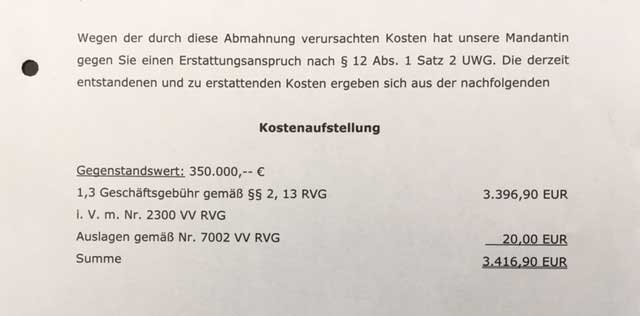Call us: +49 69 915076-0
Your contact person:

Thomas Seifried, Attorney at Law (Rechtsanwalt) and Specialist Lawyer for Intellectual Property (Fachanwalt fuer gewerblichen Rechtsschutz)
Free initial assessment
Our initial assessment of your case is free of charge.
SEIFRIED IP
Eschersheimer Landstraße 60 - 62
60322 Frankfurt am Main
+49 69 91 50 76 0
info@seifried.pro
No reimbursement of warning costs in the case of self-warning and mandating by oneself
Anyone who issues a warning himself, without consulting an attorney, cannot, in principle, demand reimbursement of attorney's fees. Also who admonishes first and afterwards the same again by a lawyer - and this time additionally a punishment-reinforced omission explanation demands - the lawyer costs of this second warning should not be able to require (OLG Frankfurt v. 10.01.2012 - 11 U 36/11).
Nor can a lawyer who warns against an infringement of his own rights (so-called "Selbstauftrag"), for example an infringement of competition due to an infringement of the Legal Services Act (RDG), assert his costs (BGH v. 6.5.2004 - I ZR 2/03 - Selbstauftrag).
No reimbursement of warning costs despite justified warning in the case of gross content defects
Despite a justified warning, there are cases in which the person issuing the warning still has no claim to reimbursement of the costs of the warning. This is the case if the warning is grossly defective. In order to fulfil their purpose, the offence committed must be precisely indicated in a warning letter and the offence seen therein must be so clearly indicated that the admonitioner can recognize what he is accused of and can make an effective cease-and-desist declaration. In particular, active legitimacy must also be adequately demonstrated. Warnings that do not meet these minimum requirements represent a completely unusable service for which no reimbursement of costs can be claimed (see OLG Düsseldorf, decision of 14.11.2011 - I-20 W 132/11).
No reimbursement of costs for further warnings with the same aim
Even if you send several warning letters to several opponents, you may still only be able to charge a fee once if the matter is the same under fee law (§ 15 Rechtsanwaltsvergütungsgesetz - RVG). This is all the more obvious the more identical the warnings are and the closer the success intended with the warnings belong together, even if the persons warned because of a press article are, for example, the author, the publisher, the domain owner and the operator of an online offer (see BGH v. 19.10.2010 - VI ZR 237/09).
Reimbursement of costs after signed cease-and-desist declaration
If the cease-and-desist declaration is signed with the obligation to reimburse the lawyer's fees, the costs can easily be claimed: In the process, the party issuing the cease-and-desist letter only has to present the signed cease-and-desist declaration with the obligation to reimburse the fees. It then no longer matters whether the warning was justified or not. However, if the recipient of the warning cancels this obligation, the person issuing the warning must sue for the fees. In this "small fee process", the person issuing the warning must now present and prove that the warning was justified. In the case of a warning letter in trademark law, he must now present and prove everything he would have to present in the trademark lawsuit (trademark, distinctiveness, infringement of the trademark, active legitimation, passive legitimation, etc.).
In view of the extremely low value in dispute compared to the original value of the object (the dispute is now only about the lawyer's fees, no longer about the original and expensive injunctive relief), many lawyers will engage in a negotiation of the fees. After all, such processes often cannot be carried out in an economically reasonable manner for the person issuing the warning.
Warning costs in case of danger of a first infringement
In the case of the so-called first infringement risk, it may not be necessary to reimburse any lawyer's fees for the warning. In contrast to the danger of repetition, which is rebuttably presumed by an already committed infringement of rights, an infringement of rights is still to come with the first infringement risk. The person issuing a warning notice asserts a so-called "preventive injunctive relief". Whether these costs have to be reimbursed varies from case to case. In any case, who is not claimed as perpetrator, but as disrupter on omission, does not have to refund warning costs for the first reminder (OLG HH ZUM-RD 2009, 317 - Mettenden).
Reimbursement of costs with own legal department
In principle, the party issuing a warning notice can also demand reimbursement of lawyer's fees if it has its own legal department (BGH NJW 2008, 2651 - Abmahnkostenersatz).
Reimbursement of warning costs in the case of warnings by associations
However, competition associations (e.g. Wettbewerbszentrale) can also claim their (comparatively low) lump sums in full if the warning is only partially justified (BGH v. 10.12.2009 - Az. I ZR 149/09 - Sondernewsletter).
Professional associations (e.g. a taxi association), on the other hand, which pursue violations of competition law according to their statutes, cannot claim reimbursement of the costs of an engaged lawyer. This also applies if the professional association only pursues violations of competition law in exceptional cases and has no legally trained personnel of its own (v. 06.04.2017 - I ZR 33/16 - Anwaltsabmahnung II).
Amount of the lawyer's fees reimbursable for a warning letter
Depends on the respective value in dispute

There is always a dispute about the amount of the lawyer's fees to be reimbursed for a warning letter. Several factors play a role here: the respective value in dispute, the fee rate applied and the involvement of a patent attorney. The most important factor in calculating the lawyer's fees is the respective value in dispute. It is calculated according to the "interest" of the person issuing the warning in the action to be omitted. The item values in the following only relate to the (most expensive) injunctive relief. The more favourable subsequent claims are set at only a fraction of the injunctive relief. The warning costs, in turn, do not increase the value of the object at all.
Values in dispute under competition law
In competition law, the respective values in dispute starting at € 25,000.00. Lower values will only be applied to local competitors with a small business. Values worth more than € 500,000.00 will be accepted at large companies with international customers.
Values in dispute in trademark law and design law or design law
Amounts below € 50,000.00 rarely occur as values in dispute in trademark law and other trademark law. In the case of large companies, values in excess of € 1,000,000.00 may also be appropriate. The same applies to design law.
Principle: 1.3 fee
The fee rate for the business fee to be applied is often only 1.3: Federal Court of Justice of 11 July 2012 - VIII ZR 323/11
Also in trademark and trademark disputes often only a 1.3 fee can be charged (OLG Frankfurt v. 8.11.2012 - 6 U 208/11; LG Düsseldorf v. 27.11.2013 - 2a O 42/13)
However, matters relating to design law or design patent law and utility model law are not per se particularly extensive or difficult (BGH v. 13.11.2013 - X ZR 171/12 - Einkaufskühltasche). Whoever demands a higher business fee than 1.3, has to justify the special scope or the special difficulty.
Increase to 1.5 or 2.0 possible in case of special difficulties
An increase beyond this, for example to a 1.5 or a 2.0 fee, is only possible if the activity of the lawyer was extensive or difficult (BGH v. 11.7.2012 - VIII ZR 323/11). In extensive or more difficult cases, such as difficulties in connection with the infringement period, the large number of acts of infringement and the lack of consolidated licence rates, a 2.0 fee may also be appropriate (BGH v. 29.07.2009 - I ZR 169/07 - BTK, Rz. 51).
Author: Thomas Seifried, trademark lawyer Europe and trademark lawyer Germany
